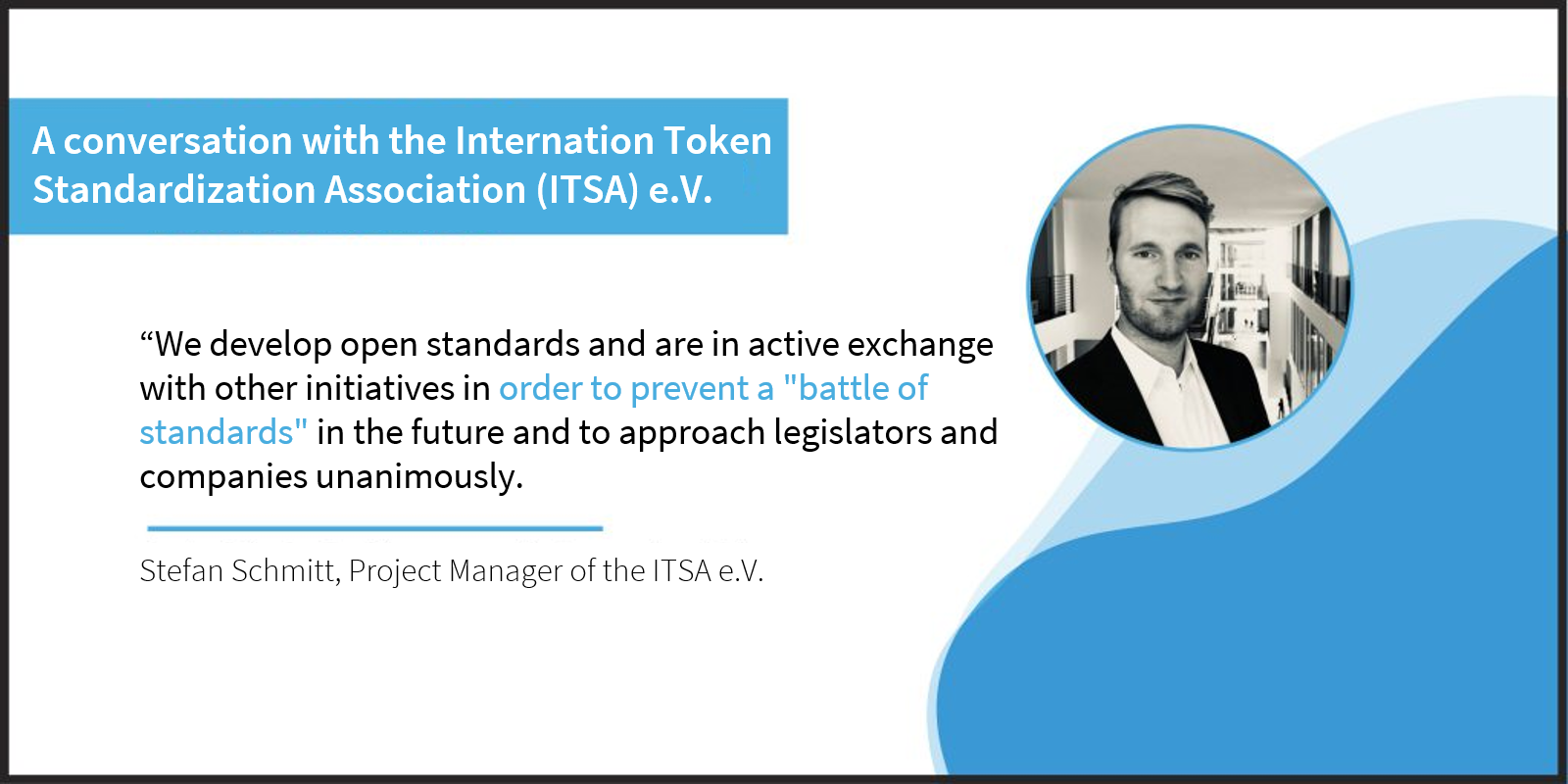
EXPERT INTERVIEW
A standardization for digital securities: A conversation with ITSA e.V.


Cashlink: Dear Stefan, we are happy that you are our guest today. Please introduce yourself and the International Token Standardization Association!
Stefan Schmitt: Thank you very much for the invitation! First to the International Token Standardization Association (ITSA) e.V. The ITSA is a non-profit association under German law, whose goal is to promote the development and implementation of comprehensive market standards for the identification, classification and analysis of DLT and blockchain-based cryptographic tokens. Who and why, we will discuss later.
My name is Stefan Schmitt, I am a project manager at ITSA and have been working for the association for over a year. I also work at the Frankfurt School Blockchain Center and have advised various startups as a freelancer. I bring this experience to ITSA to advance our projects and build a strong network.
Cashlink: The International Token Standardization Association promotes the standardization of digital securities. Why is this necessary?
Stefan Schmitt: Financial markets have existed before the blockchain came around. For years we have seen many ambitious startups, fintechs if you like, who often specialize in a very special use case and want to improve it. In doing so, they challenge universal banks that cover a wide range of services, but usually do so ‘only’ well, not excellently.
However, new technologies also bring with them hurdles that need to be overcome. First of all, there is the legal hurdle: Many good ideas can be implemented technically, but in the case of cryptographic values it is often not yet finally clarified how these are to be treated legally. Here a constant exchange with the regulating authority is important and this is exactly what we do. In addition, there must be standards that on the one hand meet the quality requirements of the old financial world and on the other hand help the regulating authority to set clear rules.
I have already touched on the second point. Many start-ups, whether fintechs in general or blockchain start-ups in particular, must win the trust of their customers. There are two obstacles here: On the one hand, these are new companies, but especially when it comes to finance and investment, many investors are hesitant and trust established banks. In other words, the traditional financial market participants have a large base of customers who trust them. So that these banks open themselves to the topic blockchain, crypto values and crypto currencies, it needs clear basic conditions. That is what we are working on. On the other hand a polarizing reporting around Bitcoin and Co. causes unrest and a wrong understanding of cryptovaluations – there it needs clearing-up work and above all clarity.
That is generally speaking, and not only applies to digital securities, but of course to them as well. Here in particular, the legal framework is still very imprecise and the ‘paper obligation’ applies, in other words, shares must exist in physical form. Dematerialization is a necessary step here in order to create and trade stocks and other financial products natively on blockchain protocols. Here we already see progressive steps by the federal government and the Ministry of Finance, first with regard to bonds and then hopefully also to traditional securities.
Particularly with regard to digital securities, it becomes clear what I mentioned earlier: Technically, digital securities can be implemented without any problems and the benefits are known, but there are still legal hurdles that make workarounds necessary. And that is precisely why it is important that companies that are confronted with the topic from different perspectives work together on a solution. In the case of ITSA, for example, these would be Cashlink as an infrastructure provider for issuing companies, the Stuttgart and Frankfurt stock exchanges as a trading center, and associations such as the BdB and BVI as representatives of the traditional financial market participants.
Cashlink: Recently, you and the ITSA launched the International Token Identification Number (ITIN). How does the ITIN work and how do companies apply for this ITIN?
Stefan Schmitt: The ITIN is actually not that new at all, but is one of three projects that the ITSA has been pursuing and developing since its foundation in 2018. However, we have only recently implemented another new feature, which you are probably referring to.
First in general: The ITIN is an open market standard for the unique and secure identification of DLT- and blockchain-based cryptographic tokens. In the old world, it comes closest to the ISIN or WKN, but it is far from being congruent, and is designed for the special requirements of the blockchain world. Why is a unique identification of cryptographic tokens needed? Because up to now, we still frequently have double and sometimes triple assignment of identifiers and also several identifiers for one token. Two examples: On the one hand, Bitcoin is abbreviated as BTC or XBT, depending on the marketplace. On the other hand, BAT stands for Basic Attention Token and also for Batcoin. This ambiguity is poison in discussions with traditional financial market participants, supervisory authorities and legislators and must be eliminated. We are pursuing this goal with the ITIN.
The ITIN itself is partly proactively assigned by us and partly requested by companies. For example, we work closely with you, i.e. Cashlink, and provide your new tokens directly with an ITIN. The allocation process is very simple and anyone, whether a company or an individual, can apply for an ITIN for a token via this form. We check each application and either issue a new ITIN or point out the existing identification.
However, unambiguous identification of tokens goes much further, especially in the future, and that is why we have extended the ITIN by the Uniform Token Locator (UTL). The UTL automatically retrieves various information from tokens, for example the hash after the last fork to a public blockchain protocol. This ensures that the Bitcoin blockchain is not only assigned an ITIN, but that it can be distinguished exactly which Bitcoin fork is being referred to. This makes UTL a novel identification and reference standard that is capable of uniquely identifying all types of tokens in different ledgers and is resistant to blockchain forks.
Cashlink: What is the overall standardization situation? How many members support the ITSA project?
Stefan Schmitt: The ITSA is supported by almost 100 companies, plus many individuals who are also involved and are working with us to advance the topic of standardization for token markets. We are currently seeing that the topic is being taken seriously and is supported by start-ups and large companies alike. In addition to the ITSA, there are other associations that look at the topic, sometimes from different angles. We are developing open standards and are in active exchange with other initiatives in order to avoid a ‘battle of standards’ in the future and to approach legislators and companies in a united and unanimous manner. In the future, there should be a clear standard that makes the token markets secure, accessible and transparent, making it easier for both the broad mass of private individuals and traditional financial companies to enter the world of digital assets.
Cashlink: Who are these members and what are their motives for getting involved in ITSA?
Stefan Schmitt:
Our members include traditional members from the financial market, such as Deutsche Börse and Börse Stuttgart Digital Ventures as well as the Main Incubator of Commerzbank, and industry associations such as BVI and the Association of German Banks. In addition, we are joined by many different blockchain startups and FinTechs, for example Cashlink, various Exchanges etc. We are excellently positioned, especially in the German-speaking countries, but are also expanding internationally – in Europe, Asia, the Middle East and America.
This is important because standards for the token markets are a global issue and we cannot limit ourselves to Germany alone. We cover almost the entire range of blockchain applications, especially in the financial sector, and are jointly driving the development of market standards.
Starten Sie Ihr eigenes Tokenisierungsprojekt
- Unverbindliche & kostenlose Erstberatung durch Experten
- Individuell an Ihre Bedürfnisse angepasste Lösung
- Digitalisierungsprojekte einfach, flexibel & transparent umsetzen

Haben Sie weitere Fragen zu unseren Produktpaketen?
Ich bin Michael, Co-Founder und CEO von Cashlink Technologies! Sollten Sie Fragen zu den einzelnen Produktpaketen haben, zögern Sie nicht und vereinbaren Sie gerne einen unverbindlichen Beratungstermin mit unserem Expertenteam – dieser sollte alle offenen Fragen klären!